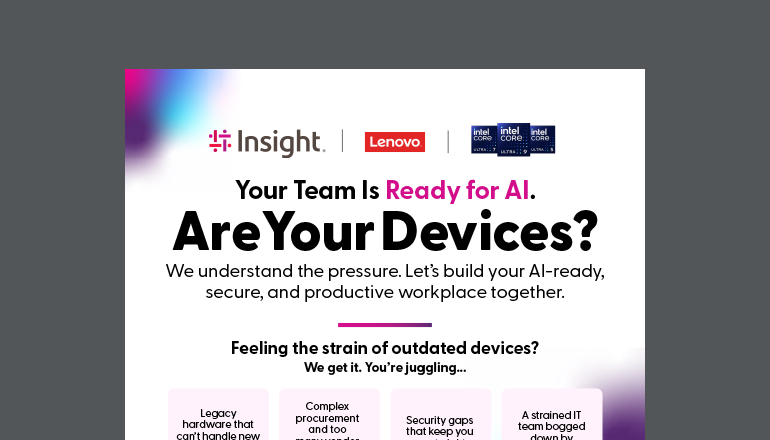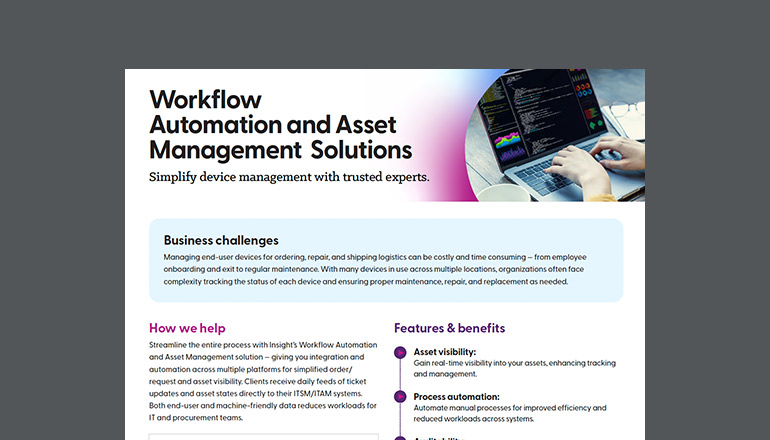Article Business Vs. Consumer Laptops – Which are Right for Your Company?
By Insight Editor / 12 Jun 2019 / Topics: Devices

Let’s say you’re the CEO of a small business with 20 or so employees. You’ll need one laptop for each worker and about five in reserve for new hires or as backup options if one were to suddenly malfunction.
Business laptops, such as the Lenovo ThinkPad, HP EliteBook, and Dell XPS cost about $1,200 per device. So that’s a total outlay of $30,000, which isn’t exactly pocket change. Moreover, their resale value can be limited.
Thus, it’s tempting to opt for the cheaper, consumer-grade option instead. The Dell Inspiron series, Lenovo IdeaPad, and HP Notebook, for example, are aimed at everyday users and priced at about $700 each. So the total comes to about $17,500, which is markedly lower than the cost of business laptops.
So, is it worth it to buy a costlier business laptop? Or can a consumer laptop service the needs of your employees just fine? In this article, we’ll take a closer look at the business laptop vs. consumer laptop debate.
Analyze Business Needs
In the debate of consumer laptop vs. business laptops, you need to take into account the requirements of your workforce.
Your teams need a highly-functional, sturdy device optimized for high battery life. Said devices run for a minimum of eight to ten hours every day with frequent video calls and use of enterprise software.
Longevity
Business laptops are pricier, but they come with the components and functionality to match. Expect retina screens, fast processors, and tough casing shells. That’s because the laptop OEMs understand the needs of business users — they need devices that run all the time and are built to last for years on end.
No corporation wants to put in a large purchase order for laptops only to see them break down after a couple of years. And they’re not going to buy the excuse that employees were tough on the devices; after all, that’s par for the course. Hence, business machines are built specifically to withstand minor drops, and some are water- and dust-resistant.
Consumer-grade laptops cost less in part because the materials used in their design aren’t nearly as durable. Manufacturers expect consumers to go easier on their personal devices and treat them with greater care. Plus, the industry standard is that consumers replace their laptops every two to three years.
Consumer laptops are flashier and may be easier on the eye in terms of design. But they’re not going to fulfill your business needs for durability.
Battery Life
The higher price for business laptops means you get better battery life, too. The Dell XPS, for example, has a battery life of about 12 hours. The Dell Inspiron provides about 5 hours. Likewise, the Lenovo ThinkPad series offers up to 15 hours of battery life, while the IdeaPad offers about 8 hours. Similarly, you will see a noticeable gap in battery life between HP’s pro- and consumer-grade laptops.
Higher battery life directly impacts your employees. It’s possible that they prefer to work remotely or are frequently traveling, such as for sales calls. You can’t expect them to have a charger handy at all times — a twelve-hour battery life means a fully-charged device will last the entire day without any problems.
Security Features
Businesses spend about $13 million each year combating cybercrime, so you want your employees’ devices to be as secure as possible. Business laptops often have features like biometric security options. What’s more, they ship with professional operating systems that are more secure than consumer-grade options.
Warranties and After-Sales Support
Another aspect of the business vs consumer laptop debate is that of warranties. Manufacturers often entice corporations for bulk purchases by throwing in dedicated after-sales support and warranties that can last two to three years.
Consumer laptops don’t get the same treatment. Individual buyers aren’t looking to purchase dozens of machines, so will have to contend with standard warranties — typically about a year or so.
Processing Power, Speed, and Storage Capacities
As mentioned earlier, business employees work with several enterprise applications at any given point. For example, I use Zoom for video calls, Slack for office chats, Jira for task management, as well as Google Docs and Drive. My laptop must be able to handle all of these applications in unison; otherwise, my productivity will drop.
Business laptops come equipped with faster processors (such as the Intel Core i7), higher RAM, and larger and faster hard drives. There is a difference in the CPUs. For example, a consumer laptop using a 7th gen Core i5 won’t be as powerful as a business laptop with an 8th gen Core i5 — the latter is quad-core, while the former is an older dual-core model.
Even in terms of things like RAM and hard drives, business laptops will generally incorporate solid-state drives (SSD) from trusted manufacturers like Samsung. Not only will these laptops be noticeably faster, they will also be more reliable. With consumer laptops — especially those on the lowest-cost end — you might get much slower hard-disk drives (HDD).
At the end of the day, you want to equip your employees with the tools they need to succeed and the machines they use are an important component. Business laptops are a superior option.




